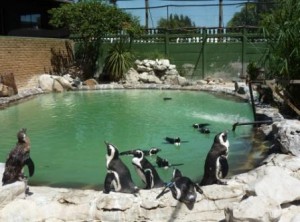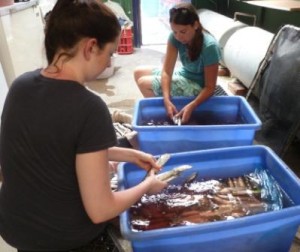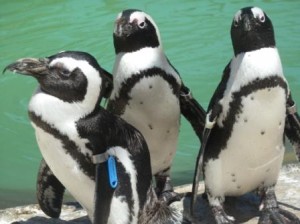
These penguins are lucky they were taken to SANCCOB for care.
When I arrived, there were penguins, in their black and white cozzies (that’s South African for “bathing suits”), hanging around the pool area. Several, faces to the warm sun, were catching some afternoon rays. Others were showing off their swimming skills. One was looking for a waiter to bring her a drink and a snack. I’m sure they were thinking, “Life is good!”

African Penguins pending the day at the pool.
And that’s a good thing, because these poor little birds have had a rough time. They’re guests of SANCCOB (the South African Foundation for the Conservation of Coastal Birds) because they’ve been injured, orphaned, or were found sick.
The goal of this group is to help South African seabirds for the benefit of present and future generations. In addition, they work on research projects to learn more about birds, AND give classes to children, teachers, and the public to help them understand the important part birds play in the coastal ecosystem. What wonderful work these people are doing!

Volunteers help prepare lunch for the birds.
When an injured bird arrives, it’s weighed, checked by the veterinarian, given medicine, food, and a safe, clean place to live. It’s looked after at SANCCOB until it’s ready to make it on its own out in the wild.
A penguin must even pass a test before it’s released. It must be able to swim for one hour. This helps the workers know that the penguin is healthy enough to survive on its own in its natural habitat (the beach and ocean around South Africa). If you’re surprised to hear there are penguins in Africa, click here.
Carole, SANCCOB’s Education Manager, told me that African penguins are “indicator species”. That means, if people notice many penguins dying, it indicates there’s something wrong with the local ocean ecosystem. Let me explain. You know penguins eat fish, right? If many fish die because the water is becoming warmer from climate change, or if it’s becoming too polluted from trash or poisons, or if overfishing takes too many fish out of the ocean, our penguin friends won’t have enough to eat. Then many penguins die, and the population decreases.
The SANCCOB workers are trying to increase the African Penguin population. The birds are an endangered species. In addition to nursing them back to good health, they also raise penguin chicks until they’re big and strong enough to take care of themselves. Then they take them to a place where there are other penguins, like Boulders Beach or Foxy Beach, and release them.

Penguins are given bands so the staff can keep track of them.
Some of the penguins are tagged or have a GPS signaling device attached to them, so the researchers can learn more about their lifestyle. They’ve discovered that some of the penguins swim all the way from South Africa to Namibia and back!

Education Manager, Carole Olivier, and Ms. Christie-Blick at SANCCOB.
It’s good to know there are people like Carole and the SANCCOB organization looking after the earth’s precious animals, and helping people to understand that all life is interconnected in food webs, don’t you think?
Click here to learn more about SANCCOB and to view their gallery of pictures.

That is so cool Mrs.christie blick.
The penguins are so cute